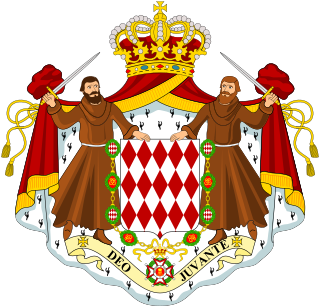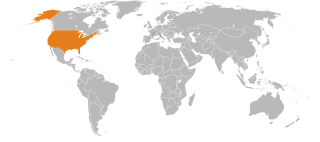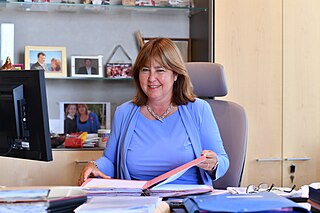Related Research Articles

The Public Force are the military force of Monaco. However, the country has a very limited military capability and depends almost entirely upon its larger neighbour, France, for defence. In total, there are over 250 people employed as military personnel in some form. There is no conscription in Monaco.

The Principality of Monaco is a sovereign and independent state, linked closely to France by the Treaty of July 1918, which was formally noted in Article 436 of the Treaty of Versailles of 1919. The foreign policy of Monaco is one illustration of this accord: France has agreed to defend the independence and sovereignty of Monaco, while the Monegasque Government has agreed to exercise its sovereign rights in conformity with French interests, whilst at the same time maintaining complete independence. Since then, the relations between the sovereign states of France and Monaco have been further defined in the Treaty of 1945 and the Agreement of 1963.

"Hymne Monégasque", also known as "A Marcia de Muneghu", is the national anthem of Monaco. It was originally adopted in 1848 with French lyrics by Théophile Bellando de Castro and music by Bellando and Castil-Blaze. The current official lyrics, which are in Monégasque, were written in 1931 by Louis Notari, while the current musical arrangement was composed in 1914 by Léon Jehin.

The Grenoble Institute of Technology is a French technological university system consisting of eight engineering and management schools.

The Compagnie des Carabiniers du Prince is the Infantry branch of the Force Publique, and one of the limited number of militaries that recruits foreigners. Although Monaco's defence is the responsibility of France, Monaco maintains a small force for the protection of the Sovereign and the Prince's Palace. Formed by Prince Honoré IV in 1817, the unit was re-organized in 1909. The company numbers 124 officers and men. Whilst the NCOs and soldiers are local, the officers have served in the French Army or the Republican Guard. Along with the Corps des Sapeurs-Pompiers, the Carabiniers form Monaco's total public forces.

The Public Security of Monaco is the national police force of the Principality of Monaco. It is subordinated from the Monegasque Department of Interior and consists of 515 men and women. With 515 police officers for 35,000 people in 1.98 km2, Monaco has the largest per-capita and per-area police force and police presence in the world. Its police includes a specialist unit which operates patrol and surveillance boats.

Monaco and the United States exchanged consular officials soon after the end of the U.S. Civil War. The first consul from Monaco to the US was Louis Borg, who presented his credentials in May 1866.

Émile Henri Roblot a French civil servant who served as the Minister of State of Monaco from 1937 to 1944.
Paul Masseron is a French civil servant (prefect) who became a minister of the principality of Monaco.
Isabelle Berro, also known as Isabelle Berro-Amadeï, is a Monégasque judge born in Monaco and who was the Judge at the European Court of Human Rights in respect of Monaco from 27 June 2006 to 1 August 2015. She was appointed Ambassador of Monaco to Germany, Austria and Poland in 2016.

The Théâtre Princesse Grace is a theatre in Monaco.

Serge Telle is a French diplomat. He served as the Minister of State of Monaco.
The Îlot Pasteur is a building on the western edge of Monaco under construction since 2016. It will be home to a new middle school, a post office, a recycling center, a data center, an underground carpark.
Claude Gauthier is a Monegasque painter.
Maguy Maccario Doyle is Ambassador Extraordinary and Plenipotentiary of the Principality of Monaco to the United States and Canada, as of 2013 and 2014 respectively, and Monaco's Permanent Observer to the Organization of American States.
Gilles Tonelli is a Monegasque engineer, diplomat and politician.
Sophie Thévenoux is a Monegasque politician and diplomat.

Marie-Pierre Gramaglia is a member of the Council of Government of Monaco, on which she serves as Counsellor of the Ministry of Equipment, Environment, and Urban Planning since 2011. She is the second woman in Monaco's history to be appointed to the council, behind Sophie Thevenoux, who served as Counsellor of Finance and Economy from 2009 to 2011.
Events in the year 2010 in Monaco.
References
- 1 2 3 4 5 6 "Département de l'Intérieur: Le Conseiller de Gouvernement - Ministre de l'Intérieur". Gouvernement Princier. Principauté de Monaco. Retrieved December 26, 2016.
- 1 2 3 4 5 6 Brun, Raphael (May 27, 2015). "Patrice Cellario : " Une immense responsabilité "". Monaco Hebdo . Retrieved December 26, 2016.
- ↑ "Département de l'Intérieur". Gouvernement Princier. Principauté de Monaco. Retrieved December 26, 2016.